Stithians
Stithians (Cornish: Stedhyans),[1] also known as St Stythians, is a village and civil parish in Cornwall, England, United Kingdom. It lies in the middle of the triangle bounded by Redruth, Helston and Falmouth. Its population (2001) is 2,004, increasing to 2,101 at the 2011 census[2] An electoral ward in the same name also exists but stretches north to St Day. The population here also at the 2011 census was 5,023.[3]
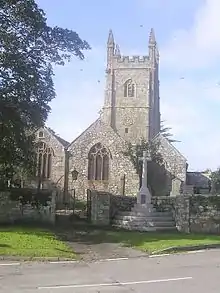
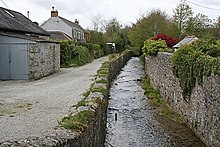
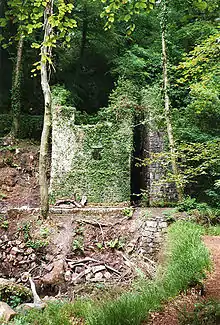
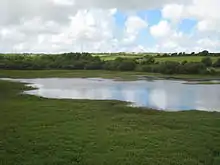
The parish is mainly agricultural, lying south of the Gwennap mining area and north of the quarrying areas of Rame and Longdowns. The River Kennall runs through the parish: in the 19th century, this river worked a flour mill and a number of gunpowder mills, machinery at a foundry, and a paper mill.
Churches
Parish church
The parish church is dedicated to St Stythian, but it is hard to identify this saint. References to the parish in 13th and 14th century records show various spellings: Stethyana, Stediana, Stedyan, Stediane, and Stidianus. The Rev. Sabine Baring-Gould's "Cornish Dedications" (1906) makes a connection with St Etaine of Tumna in Ireland, while Rev Michael Warner (Vicar of Stithians 1983-1993) suggests St Stephen.[4] The saint's feast day is the Sunday nearest 10 July, and Stithians Show is held on the Monday following Feast Sunday.[5]
There has been a church on the site since the 6th century, but the oldest part of the current church is 14th century; and the imposing tower was added in the 15th century. The former ecclesiastical parish of Carnmenellis is now merged with Stithians parish. The church has a large two manual pipe organ.
Cornish crosses
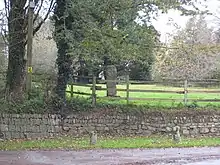
There are four Cornish crosses in the parish; they are in the vicarage garden, and at Repper's Mill and Trevalis. The cross at Repper's Mill has a crude crucifixus figure on the front and a Latin cross on the back. There are two crosses at Trevalis: both have a crude crucifixus figure on the front and a Latin cross on the back. One of the crosses formerly stood at Hendra Hill near the churchtown but was moved to Trevalis about 1860.[6] Another cross stands in the grounds of Tretheague House.
Methodist churches
John Wesley visited Stithians in 1744-50 and brought Methodism to the parish. The Hendra Wesleyan Chapel was built in 1815 and after a division among the members, the Penmennor United Methodist Free Church was built in 1866 just a few yards away (Hendra Chapel closed in 1976).
Stithians Show
Stithians Show is one of the largest one-day agricultural shows in the UK: the show is held annually in July and the attendance is in excess of 20,000. Established in 1834, it has been held continuously since then (except for three years during World War I, and five years during World War II; and there was no show in 2001 due to the nationwide outbreak of foot and mouth disease). Up until 1992, the Show was sited on fields in the centre of the village. Then the threat of rental increases as well as the show's increasing size encouraged the Agricultural Association to purchase its own land at Kennall Farm and establish a site there.
Musical ensembles
Music has always played a large part in village life. St Stythians Band (formerly St Stythians Silver Band) was founded in 1928 and became very successful in competitions in the 1960s and 1970s; during the summer months it gives weekly concerts at the Gyllyngdune Gardens in Falmouth. St Stythians Male Voice Choir was formed in 1919, only to be closed in 1926; but it was reformed in 1947 and since then has thrived, performing concerts throughout Cornwall and further afield. Stithians Ladies Choir was formed in 1966 and quickly established a high reputation. The band and choirs have made a number of successful recordings.
Philanthropy and recreation
Albert Collins (1859–1937) from Stithians travelled to South Africa in 1880 with his friend William Mountstephens from Falmouth; there their building business prospered and they contributed to many charitable institutions. In 1934, Albert Collins paid for the Playing Field, opposite the school in the centre of the village, which is still enjoyed by the children of Stithians today. The men also set up a Trust Fund under the control of the Methodist Church in South Africa, which was used to build a school in Johannesburg; the school, known as St Stithians College, opened in 1953.
Stithians Dam was completed in 1964 to create a 270-acre (1.1 km2) reservoir to the west of the village, which supplies water to a large part of the west of Cornwall. It is a place for bird-watching, fishing and water sports. Stithians has a rugby football club (founded in 1890) and a football club running two teams in the Trelawny League.
Notable people
- James Martin (1821-1899), Australian industrialist and politician, was born here
- Henry Charles Seppings Wright (1849–1937) artist and war correspondent, was born here[7]
- John Spargo, Socialist and scholar, born in the parish but settled in the United States
- Ros Atkins, BBC Journalist grew up in the village
References
- Place-names in the Standard Written Form (SWF) Archived May 15, 2013, at the Wayback Machine : List of place-names agreed by the MAGA Signage Panel Archived May 15, 2013, at the Wayback Machine. Cornish Language Partnership.
- "Parish population 2011". Retrieved 13 February 2015.
- "Ward population 2011". Retrieved 14 February 2015.
- "Archived copy". Archived from the original on 2007-09-28. Retrieved 2007-04-17.CS1 maint: archived copy as title (link)
- Cornish Church Guide (1925). Truro: Blackford, p. 13
- Langdon, A. G. (1896) Old Cornish Crosses. Truro: Joseph Pollard; pp. 117-18, 145-46 & 339-42
- WRIGHT Henry Charles Seppings 1849-1937 at artbiogs.co.uk, accessed 9 November 2020; England & Wales, Civil Registration Birth Index, 1837-1915: BIRTH, BAPTISM & CHRISTENING at ancestry.com, accessed 9 November 2020: “Name Henry Charles Seppings Wright, Birth 01/1849 (Jan 1849) Cornwall Redruth” (subscription required)
Further reading
- Pearce, Susan, ed. (1980) Always Something Interesting: aspects of history in Stithians; compiled by members of Stithians Local History Group. [Truro]: Stithians Local History Group
- Pearce, Susan, ed. (1982) Always Something Iteresting: more aspects of history in Stithians; compiled by members of Stithians Local History Group. [Truro]: Stithians Local History Group
External links
| Wikimedia Commons has media related to Stithians. |